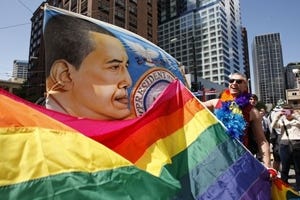About Indiana’s Religious Freedom Law

Sights and sounds of furry has erupted nationwide in the latest created crisis of public uproar from the left with equally deafening response from the right. To the high volume of debate; The Daily Caller's Casey Harper offers a simple nine things "you need to know" on both sides. Indiana’s new religious freedom law has outraged Hollywood, media and, of course, the Leftists who apparently hope to distract from the massive failures to govern both domestically and in foreign policy by the current U.S. Administration. Harper writes:
1. The law is based on the federal Religious Freedom Restoration Act, which says that the government “may substantially burden a person’s exercise of religion” only “in the furtherance of a compelling government interest” and using “the least restrictive means of furthering that compelling government interest.” The Indiana law is not specifically targeted at gay people and does not even mention sexuality, but gay rights advocates say the law’s language is ripe for abuse.
2. This law is not a get out of jail free card for “discriminators.” If someone discriminates against a gay person, the gay person can still take the discriminator to court and win. Now, however, the person accused of discrimination can invoke the state’s RFRA law as a legal weapon to defend themself. That weapon could win or lose depending on the validity of their case and the ideological leanings of their judge.
3. In the approximately 20 years RFRA has been federal law, not a single person has successfully used RFRA to circumvent civil rights laws. Some people have tried and failed.
4. This law already exists in different forms at the federal level and in 19 states across the country. Those laws passed without nearly the same hullabaloo.
5. A large reason for the controversy now is that, as American Civil Liberties Union Director Jane Henegar puts it, many believe “the bill was introduced as a backlash reaction to achieving marriage equality for same-sex couples in Indiana.” The previous RFRA laws passed before gay marriage was such an issue. This time around, gay rights groups are fearful that RFRA will be used to target them, particularly in conservative states where judges may be more willing to stretch the bounds of what RFRA has traditionally been used for.



